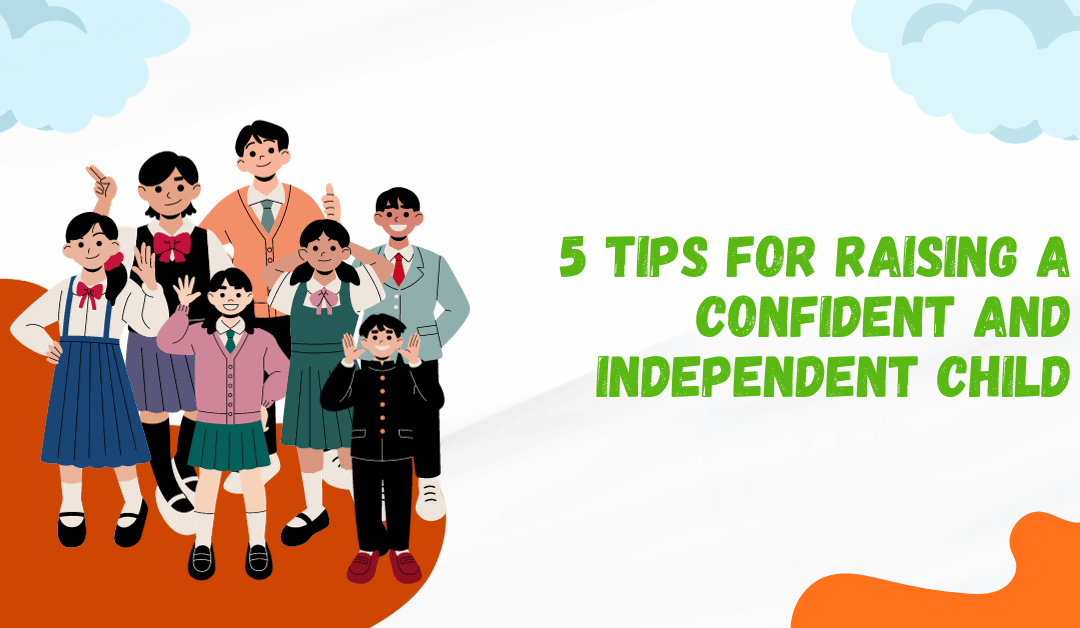
by admin | May 16, 2021 | Uncategorized
Raising a confident and independent child is a goal that many parents share. A confident and independent child is better equipped to navigate the world around them, make healthy choices, and form strong relationships. But how can parents cultivate these traits in their children?
Here are five tips for raising a confident and independent child:
- Set clear boundaries and expectations.
Children need structure and consistency to feel safe and secure. Clear boundaries and expectations give children a sense of security and help them understand what is expected of them. When children know what to expect, they are better able to make healthy choices.
- Encourage independence and self-reliance.
Children are naturally curious and want to explore their world. Encourage your child to be independent by giving them opportunities to make decisions, solve problems, and take responsibility for their actions. Let them choose their clothes, make their meals, or plan their activities. This will help them to develop the skills they need to be self-reliant and independent.
- Help children to develop a positive self-image.
Children are constantly learning about themselves and the world around them. Help your child to develop a positive self-image by giving them positive feedback and praising them for their efforts and accomplishments. Help them to see themselves as capable and competent. Encourage them to set goals for themselves and work towards achieving them.
- Teach children about emotions and how to cope with them.
Children are still learning about their emotions and how to cope with them. Teach your child about their feelings and help them understand that it’s okay to feel sad, angry, or scared sometimes. Help your child to find healthy ways to cope with their emotions, such as talking about them, writing them down, or doing something active.
- Be a good role model.
Children learn by example. Be a good role model for your child by setting a positive example in your behavior. Show your child how to be confident, independent, and responsible through how you live your own life. Show them how to be respectful, kind, and empathetic towards others. Show them how to be resilient and learn from mistakes when things don’t go as planned.
How Can You Make Your Child More Confident?
Using nursery rhymes, stories, and educational activities, you can help your child develop a strong sense of self and learn essential life skills. Nursery rhymes are an effective way to teach children language and social skills. Stories can be used to explore emotions and complex ideas such as empathy, respect, and resilience. Choosing songs with uplifting beats and thought-provoking messages, like Clubbaby’s latest collection of nursery rhymes, can help promote physical, emotional, and cognitive growth in kids.
Educational activities allow children to learn and practice new skills such as counting, following directions, problem-solving and critical thinking. By providing your child with various activities that foster learning, creativity, and self-expression, you can help them become more confident and independent.
By following these five tips, you’ll be helping your child develop critical life skills and a strong sense of self that will equip them with the confidence and independence they need to navigate the world around them.
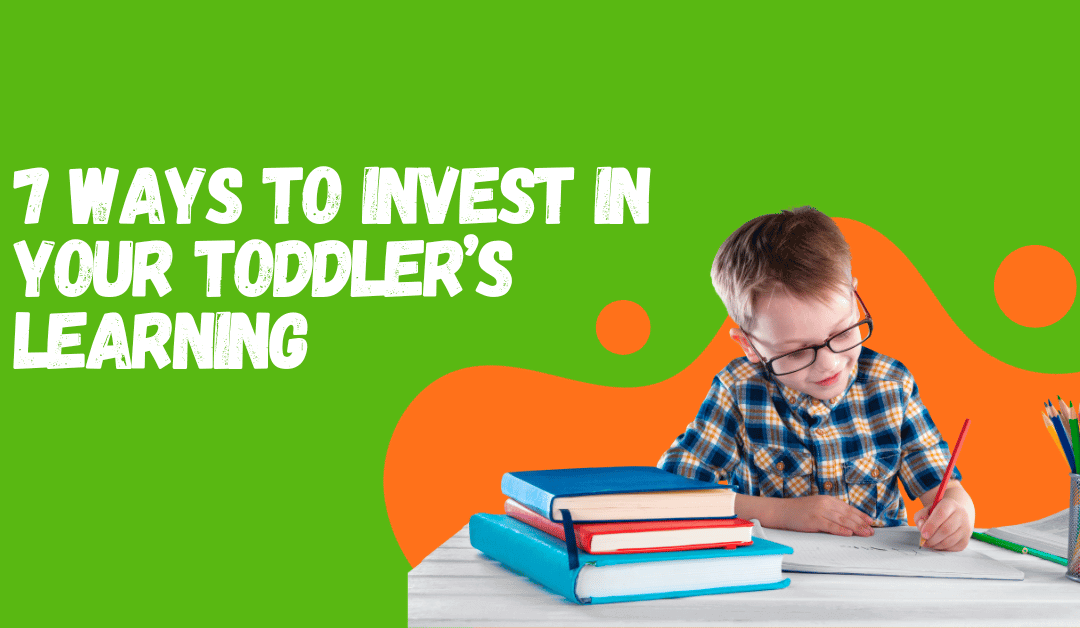
by admin | Apr 16, 2021 | Uncategorized
As a parent, providing your toddler with various experiences that foster their learning and development is vital. It is imperative to invest in your toddler’s learning, as the experience gained during the early years of life has a tremendous impact on future academic success. Research has found that children who participate in appropriate educational activities and receive proper instruction during the toddler years are more likely to perform better in school and even have higher IQs later in life.
Investing in your toddler’s learning can help foster a love of learning from an early age. Providing fun and educational activities will give them the tools to explore their environment, build problem-solving skills, develop language and communication abilities, practice self-regulation and control emotions effectively, and eventually become successful academically and practically.
Here are seven ways you can invest in your toddler’s learning through music:
Introduce educational music for children
Educational music for children is designed to teach your toddler important skills such as counting, the alphabet, and basic concepts such as colors and shapes. Many educational music albums for children can be found online or in music stores, and many are available for streaming services, which allow you to play them on demand.
Make use of nursery rhymes
Nursery rhymes are a classic way to teach toddlers language skills and improve their memory. You can find nursery rhymes on many educational music albums for children or online. You can even make up your rhymes to sing to your toddler, using things you see and do together during the day.
Use jingles and rhymes to make learning fun
Jingles and rhymes can be used to teach your toddler various concepts in a fun and interactive way. For example, you can use jingles and rhymes to teach your toddler the names of different body parts or the names of different animals.
Play for play music
While it is a lot of free music available online, it can be beneficial to invest in paid for unique music for your toddler. These songs are often specifically tailored to the developmental needs of toddlers and can be a great way to introduce them to new concepts and ideas. Choosing pieces with uplifting beats and thought-provoking messages, like Clubbaby’s latest collection of nursery rhymes, can help promote physical, emotional, and cognitive growth in kids.
Incorporate music into daily activities
You can incorporate music into many of your daily activities with your toddler, such as during mealtime, bath time, or playtime. This can make these activities more enjoyable for you and your toddler and be a great way to teach them new concepts.
Make use of technology
There are a variety of apps and websites that offer music designed for toddlers. These apps can help teach your toddler essential skills such as counting and the alphabet and can be accessed from a tablet or phone, making it easy to incorporate music into their daily routine.
Take your toddler to a music class
Many communities offer music classes specifically for toddlers. These classes are led by a teacher and allow your toddler to interact with other children while learning through music. It’s a great way to introduce your toddler to new instruments and music styles and expose them to a musical environment.
In conclusion, incorporating educational music into your toddler’s daily routine is a great way to invest in their learning and development. By introducing educational music for children, making use of nursery rhymes, jingles, and rhymes, investing in paid unique music, incorporating music into daily activities, utilizing technology, and taking your toddler to a music class, you can provide your toddler with a variety of experiences that will foster their learning and development. Music is a powerful tool that can be used to teach your toddler essential skills, improve their memory and concentration, and make learning fun and interactive.
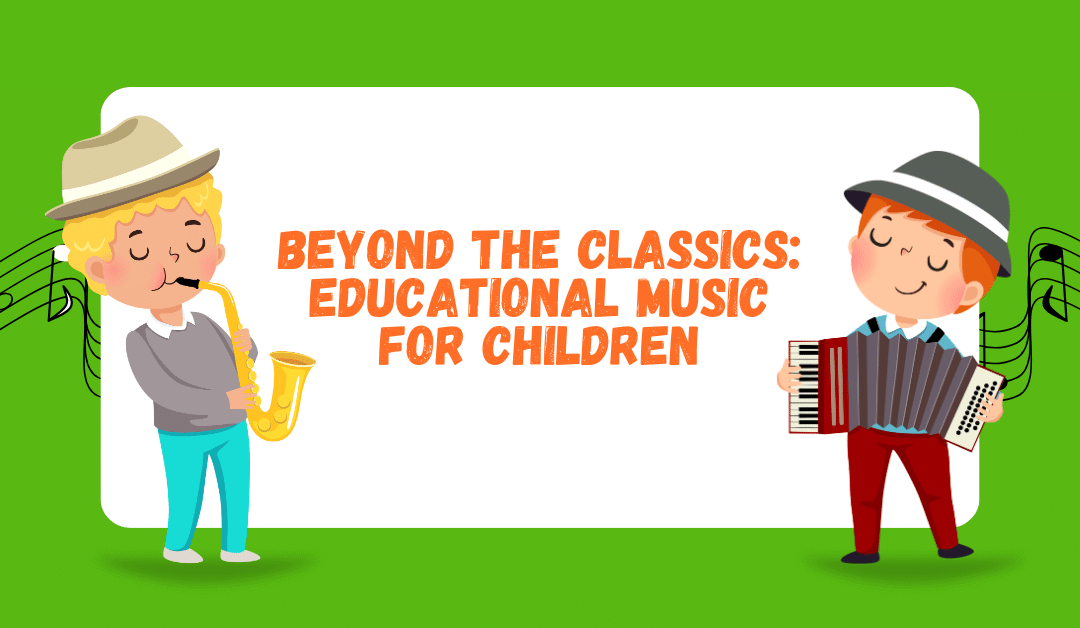
by admin | Mar 13, 2021 | Uncategorized
Music education is an essential part of comprehensive education for children. It helps to develop creativity, stimulates the brain, and exposes students to various musical styles, techniques, and cultures. Music can also be an excellent way to express emotion and connect with others in meaningful ways. However, many parents and educators tend to stick to classical music as a go-to for children’s music education.
This article will discuss ten unique and diverse music styles that can provide educational and developmental benefits for children beyond the classics.
- Folk Music: Folk music is a genre closely tied to a particular region’s culture and traditions. It is often passed down through generations and is a great way to expose children to different cultures and historical perspectives.
- Blues Music: Blues music is an American roots genre that has significantly influenced many other styles of music. It is characterized by its use of the blues scale, repetitive rhythms, and lyrics that often deal with hardship and adversity. This genre can be an excellent tool for helping children understand and process their own emotions.
- World Music: World music encompasses a wide range of styles and cultures and can be a great way to expose children to different sounds and instruments from around the world.
- Jazz Music: Jazz is known for its improvisation, syncopated rhythms, and use of various chord progressions. It can help children to develop their creativity and improvisation skills and build their musical vocabulary.
- Gospel Music: Gospel is a Christian-based music genre characterized by its powerful vocals, call-and-response structure, and emphasis on spiritual themes. It can be an excellent way for children to learn about faith, spirituality, and the power of music to inspire and uplift.
- Hip-Hop Music: Hip-hop is a genre that has grown in popularity in recent years, and it can be a great way to expose children to different styles of music. Hip-hop encourages self-expression, creativity, and originality, which can benefit children’s development.
- Reggae Music: Reggae is a genre that originated in Jamaica and has become popular worldwide. It has a unique sound that combines blues, rocksteady, and ska. It is often seen as a way to spread peace and social justice messages, making it a great educational tool for children.
- Electronic Music:Electronic music has grown in popularity recently and is a great way to expose children to new sounds, technologies, and techniques. This genre can help develop creativity as students learn to create beats and melodies using modern technology.
- Country Music: Country music is a genre that originated in the United States, and it is often characterized by its relaxed tempos, use of the guitar and fiddle, and lyrics that reflect rural life. It can be a great way to teach children about life in rural areas and provide them with insight into the lives of everyday people.
Why Choose the Selection From Club Baby?
Club baby is a delightfully unique line of high-quality educational entertainment products for children that focuses on using music to create an engaging learning experience. We have everything you need to help your child learn and grow, from interactive toys and books to musical instruments and educational videos. Our music is designed with love and care, ensuring your little one gets the most out of their learning experiences!
Start exploring Club Baby’s range of educational toys, books, and instruments today!
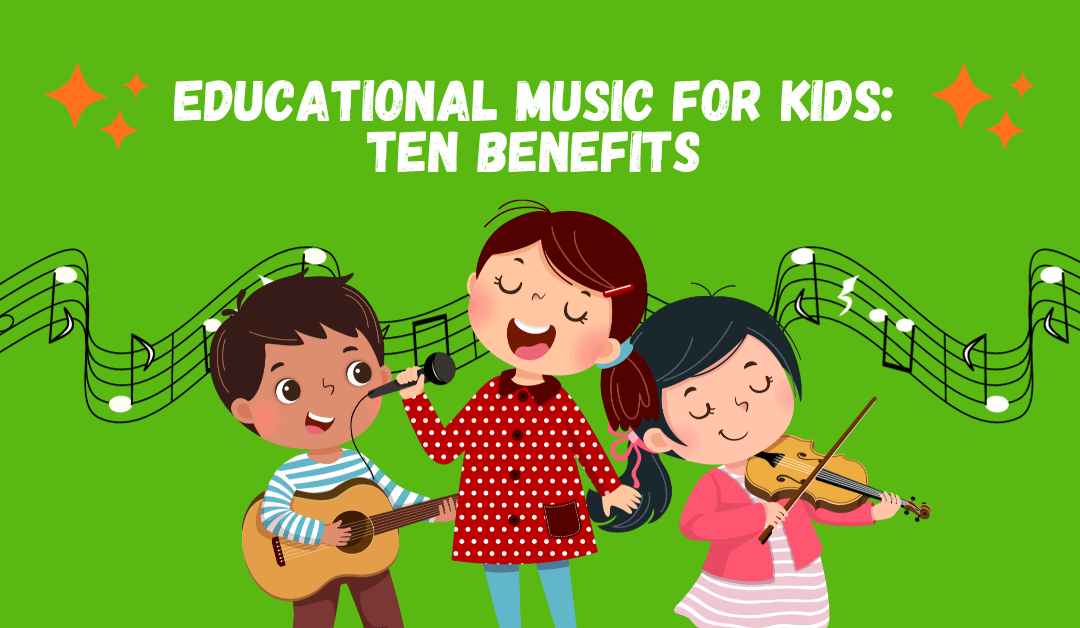
by admin | Feb 13, 2021 | Uncategorized
Music Education is an integral part of a comprehensive education for children. It helps to develop creativity, stimulates the brain, and exposes students to various musical styles, techniques, and cultures. Music can also be an excellent way to express emotion and connect with others in meaningful ways.
This article will discuss ten benefits music education has for kids.
Why is Music Education Beneficial for Kids?
- Improved Academic Performance:
Music has been found to impact academic performance, particularly in math and reading, positively. Studies show that music can help students increase their understanding of concepts and improve their test scores. This is likely since music requires concentration, focus, and attention — all skills necessary for academic success.
- Enhanced Social Skills:
Music can help kids build better relationships with their peers. Learning and playing music together is a great way to foster cooperation, collaboration, respect, and communication.
- Developing Creativity:
Music encourages creativity in many different ways. In addition to creating and exploring melodies and rhythms, students can learn how to arrange and compose their pieces of music. This creative process can be a great way to express emotion and explore personal interests.
- Better Self-Esteem:
Music is an excellent medium for self-expression, allowing kids to practice developing confidence in their abilities. As they become more proficient at playing an instrument or singing, they can take pride in their accomplishments and create a better sense of self-worth.
- Improved Memory:
Music education is associated with improved memory, especially regarding the recall of facts and concepts. This could be because music involves memorizing patterns, rhythms, and melodies — making it easier for students to remember information.
- Increased Cognitive Development:
Music can help kids develop their cognitive skills. Not only does it require concentration and focus, it also involves using both hemispheres of the brain. Furthermore, music can stimulate different areas of the brain, which can help improve problem-solving skills and analytical ability.
- Emotional Development:
Music can evoke powerful emotions, which can help children understand and express their feelings. Whether it’s through singing, playing an instrument, or listening to a favorite song, music can provide a safe outlet for children to express their emotions and healthily process them.
- Cultural Awareness:
Music education exposes children to various musical styles, cultures, and traditions worldwide. This can help children appreciate human culture’s diversity and develop a greater understanding and respect for different societies.
- Fine Motor Skills Development:
Playing a musical instrument requires fine motor skills, such as dexterity and hand-eye coordination. This can help children to develop these skills, which can transfer to other areas of their lives, such as sports and writing.
- Physical Health:
Studies have shown that playing music can help to reduce stress and promote physical health. Playing an instrument can help lower blood pressure, improve heart rate, and release endorphins, often called “feel-good” hormones.
In conclusion, music education has a wide range of benefits for children. It helps to improve academic performance, enhances social skills, develops creativity, and benefits emotional, cognitive, and physical health.
It’s essential to consider factors such as age-appropriateness, content, and message when choosing music for kids. Choosing songs with uplifting beats and thought-provoking messages, like Club Baby’s latest collection of nursery rhymes, can help promote physical, emotional, and cognitive growth in kids.
Music education can also help children develop an appreciation for different cultures and fine motor skills. As a parent, exposing your child to music from an early age is crucial as encouraging them to participate in music classes or lessons, which can have a lasting impact on their overall development.
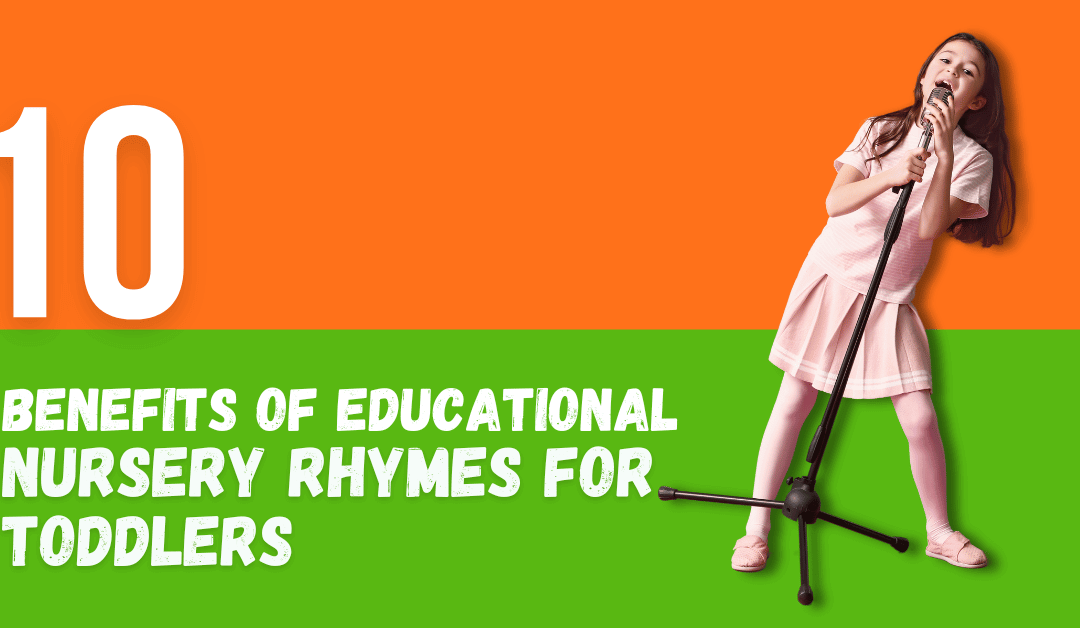
by admin | Jan 13, 2021 | Uncategorized
Nursery rhymes have been a beloved part of childhood for centuries, providing a wide range of benefits that extend beyond just entertainment. From boosting language skills to promoting creativity and imagination, nursery rhymes are essential to a child’s development.
Toddler Nursery Rhymes Offer 10 Benefits
Here are the top 10 benefits of educational nursery rhymes for toddlers:
- The Perfect Introduction to Literature:Nursery rhymes are easy for young minds to understand and remember, making them the perfect first story for children. They also help to develop vocabulary and language skills.
- Early Language Development: Nursery rhymes help children learn about rhyme, rhythm, and repetition, which are crucial for reading and writing.
- Sense of Community:Participating in nursery rhymes can help children feel connected to others and their cultural heritage, and sharing them can be a bonding experience.
- Improved Memory and Concentration:The repetitive nature of nursery rhymes makes them easy to remember, and the catchy tunes can hold a child’s attention, leading to better concentration and attention span.
- Promoting Creativity and Imagination:Nursery rhymes often contain colorful characters, animals, and landscapes, which can inspire children to create their own stories and worlds in their minds.
- Self-Expression:Nursery rhymes can be a valuable tool for children to express their emotions and provide comfort and security.
- Improved Cognitive Development:Nursery rhymes can help children develop their cognitive skills, problem-solving, and analytical abilities.
- Emotional Development:Music can evoke powerful emotions, which can help children understand and express their own feelings.
- Cultural Awareness:Music education exposes children to various musical styles, cultures, and traditions worldwide.
- Fine Motor Skills Development: Playing a musical instrument requires fine motor skills, such as dexterity and hand-eye coordination, and nursery rhymes can be a great way to encourage the development of these skills.
When selecting music for kids, it’s essential to consider factors such as age-appropriateness, content, and message. Choosing songs with uplifting beats and thought-provoking messages, like Club Baby’s latest collection of nursery rhymes, can help promote physical, emotional, and cognitive growth in kids. By exposing children to age-appropriate musical genres, parents can ensure that their kids are exposed to positive messages and sounds that inspire their creativity and facilitate healthy social relationships. Ultimately, music can broaden a child’s understanding and appreciation of their surroundings.
In addition to being enjoyable and entertaining, music can be a potent tool in a child’s development! When promoting educational growth in toddlers, nursery rhymes are one of the best ways.
Page 6 of 8« First«...45678»




